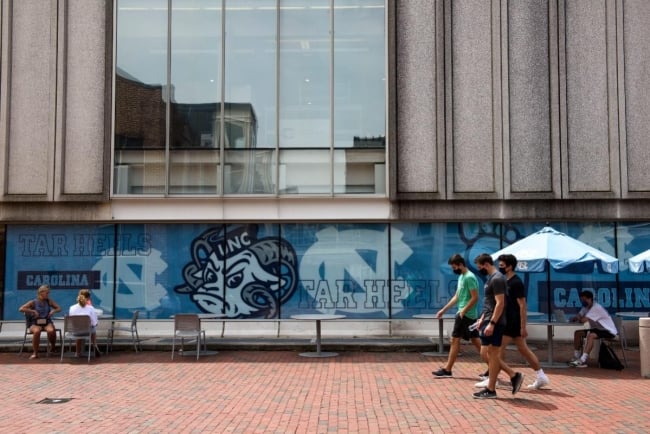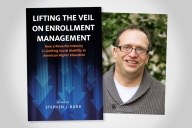You have /5 articles left.
Sign up for a free account or log in.

COVID-19 cases are rising at the University of North Carolina at Chapel Hill.
Melissa Sue Gerrits/Getty Images
Enraged University of North Carolina at Chapel Hill students met inside a conference room Friday to demand the administration do more to protect them from COVID-19.
The students -- all members of the Campus President's Council, a collective of student leaders from across the university -- signed an open letter titled "Enough Is Enough," calling for a vaccine mandate, frequent COVID-19 testing and more testing centers on campus. Lamar Richards, the undergraduate student body president, called for the emergency meeting after the Undergraduate Student Government Executive Branch first published the open letter Thursday.
“In response to the continued onslaught of COVID-19 cases and community spread on and off-campus, the value of the safety of the Carolina community -- our Carolina -- has been used as a prop -- as a negotiable -- for the self-serving purpose of heightening public-facing institutional ‘reputation’ and ‘integrity,’” the open letter states.
As of Monday morning, more than 260 students and professors had signed the open letter.
Currently, UNC Chapel Hill has an indoor mask mandate and is encouraging students, faculty and staff to be vaccinated. According to the institution's COVID-19 dashboard, 90 percent of students are vaccinated, as are 87 percent of all employees. Since last month, 466 students and 74 employees have tested positive for COVID-19. Unvaccinated students are required to test for COVID-19 twice per week and unvaccinated employees once per week beginning Sept. 15.
The concerned students are trying to avoid a repeat of last year, when just days after welcoming students to campus, the university told undergraduates to move out of their dorms and complete their courses online at home, following the positive COVID tests of 130 students and five employees.
UNC Chapel Hill is one of a growing number of campuses where students and faculty are at odds with administrators over what they consider to be inadequate COVID-prevention protocols. At Stanford, hundreds of resident assistants went on strike after the administration failed to meet their demands for stricter COVID protections. Professors at Pennsylvania State University, the University of Georgia and Middle Tennessee State University are among those who have quit in protest of lax COVID policies.
During the UNC meeting’s public comment period, many students demanded stricter COVID-19 protocols, with some suggesting a vaccine mandate now that Pfizer’s vaccine is FDA approved.
“The choices that this university has made over the past year and a half have been really disappointing and have, frankly, put the health of the community at risk,” one student said during the meeting.
Samuel Robinson, an undergraduate senator, suggested the university take three actions: establish more testing sites on campus, require testing at least once a week for all in-person students and institute a vaccine mandate.
“I think this university has an obligation not only to protect each of us as students and make us feel safe, but specifically the faculty, many of whom have been here and dedicated so much of their professional and personal lives to this university and to our student body,” Robinson said during the meeting.
Taliajah Vann, president of UNC Chapel Hill’s Black Student Movement, attributed the number of COVID-19 cases “to the university's poor decision making and prioritization of profit and return to normalcy over the physical health and safety of our campus community.”
“No return to normalcy is worth the health and safety of our community,” Vann said. “The sooner we prioritize student and employee health, the sooner we can truly return to normal.”
Additionally, Vann said the “refusal to change course at this stage is made more heinous” by the fact that the state's ICU beds are near capacity.
Collyn Smith, undergraduate vice president, called on the Campus President’s Council to adopt and sign the open letter by the executive board officers and urged administrators to include students in the COVID-19 decision-making process.
“We expect and hope that you respect us enough as primary stakeholders at this university to formally respond to the letter drafted by our executive board,” Smith said. “The time for waiting is over.”
According to a press release and tweet from the undergraduate student government, UNC Chapel Hill chancellor Kevin Guskiewicz, provost Bob Blouin and director of campus health services Ken Pittman were supposed to be at the afternoon meeting. But they didn't show because the event was “misrepresented to the chancellor and the campus,” a university spokesperson said. In an email shared with Inside Higher Ed from Guskiewicz to Richards, the UNC chancellor wrote that he thought the meeting was “with a small group of student leaders” and wasn’t aware it would be open to the public.
“What you described in your email yesterday is now very different from what you originally invited us to participate in with student leaders,” Guskiewicz wrote in the email. “As a result, we will not be attending your meeting today.”
“Today’s student government press conference grossly misrepresented the University’s detailed, multi-layered safety plans that were designed based on the advice of our top infectious disease faculty, public health experts, the Orange County Health Department and the input of our campus,” UNC Chapel Hill spokesperson Joanne Peters Denny said in a statement. “The Chancellor values student input and will continue to work directly with student leaders in the best interest of the campus, but he will not participate in publicity stunts.”
During the meeting, Richards criticized the administrators' lack of attendance, urging them to listen to students.
“Today I think I came up with a different definition of what leadership means … It means showing up,” Richards said. “I say that as I look at the empty seats where administration should be listening to the students, our most central stakeholders at this university.”
Richards added that the meeting was arranged to give students from historically marginalized communities a platform to speak with administrators about their concerns.
“When I invited the administration to a space where I have exactly that -- people that were never given the platform to do this -- I expected their attendance,” Richards said. “It is very unfortunate that they decided not to join us today.”








